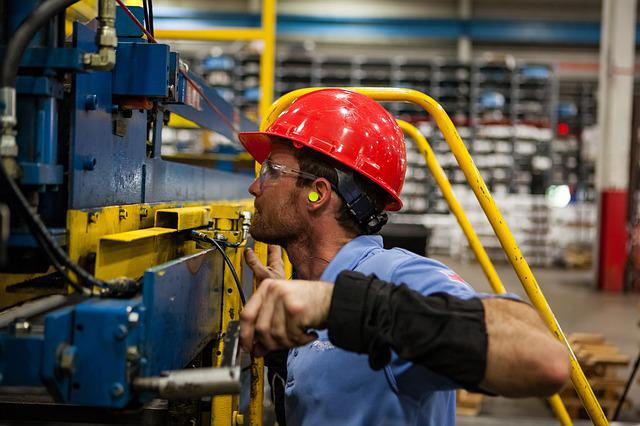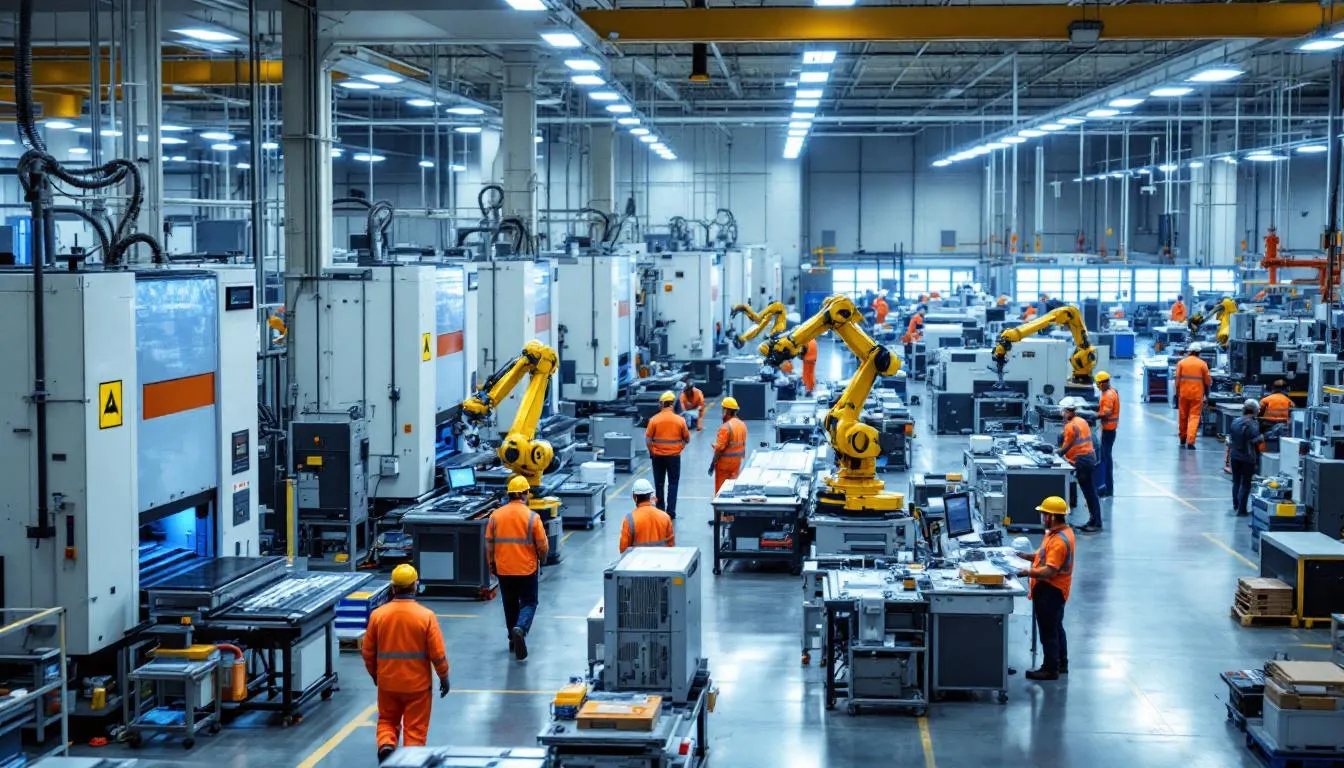What are Manufacturing Loans?
A wide range of loans is available for manufacturing companies. Each loan type comes with different advantages and disadvantages.
Since factories require expensive machinery and equipment, equipment financing is one of the most commonly used loan types in the manufacturing industry.
Manufacturing Equipment Financing
An equipment loan is a type of small business loan where the purchased equipment serves as collateral. You typically won’t need to provide any additional collateral and can potentially finance up to 100% of the equipment cost.
Using the equipment as collateral means a lower risk for the lender, who, in turn, lends larger amounts of money at lower interest rates and longer repayment terms. When you pursue this type of financing, you will need the invoice from the equipment vendor.
Comparing loan amortization to equipment depreciation helps determine the best finance terms for equipment acquisition. A longer loan term can result in lower monthly payments, but a shorter term can save on total interest costs.
The invoice price is the amount you’re requesting for the financing needed. The lender will analyze the amount requested, the value of the equipment, your credit rating, and your business when deciding on your loan request.
Equipment loan features:
- Loan amount: Up to $5 million per piece of equipment.
- Loan terms: Between 1 and 6 years.
- Interest rates: Start at 3.5%
- Funding speed: 3-10 business days.
Other Manufacturing Business Loans
While equipment financing helps you get essential manufacturing tools and machines, there are other business loans to consider.
Let’s look at each type of small business loan and how it can help your manufacturing business.
Small Business Administration (SBA) Loans
SBA loans are often regarded as the gold standard of small business loans and one of the most sought-after long-term financing options. The government-backed SBA loan program offers high borrowing amounts with competitive interest rates and favorable terms.
Unfortunately, SBA loans have stringent credit requirements, and the application process is lengthy, requiring a substantial amount of paperwork. SBA loans are best for manufacturing companies and small businesses with excellent credit.
Business Lines of Credit
Business lines of credit are similar to credit cards in that you have available credit, allowing you to access funds as needed. When you draw expenses against your business line of credit, you pay it back with interest in monthly/weekly payments. It can help with miscellaneous costs when you don’t have enough cash flow.
Working Capital Loans
A working capital loan is a short-term financing option designed to help address cash flow issues and cover day-to-day expenses, such as purchasing raw materials and other operational necessities. You can use the funds to buy equipment or cover other costs, such as marketing.
Business Term Loan
Business term loans are the most common type of small business loan. Term loans are traditional loans where you receive a large sum upfront, which you repay with interest in fixed monthly payments for the loan term. Term loans are often used for a significant investment to expand or refinance existing business debt.
Merchant Cash Advances
If your manufacturing business processes credit or debit card transactions, you may be eligible for a merchant cash advance. With this loan type, you receive an upfront amount based on your daily credit card sales, which is repaid with future credit card sales. You can use the funds to purchase raw materials, cover cash flow shortages, or other business expenses.
How do Manufacturing Equipment Loans work?
Let’s say your manufacturing company needs to buy new conveyor belts for your factory. Or, your factory got a new order, and you need to ramp up your shipping efficiency with new packaging machinery.
You shop around and find the piece or pieces you need from equipment manufacturers. It’s a good market value, and you already know how it will help you boost revenue.
But you don’t have the working capital to afford it. Perhaps you have sufficient cash reserves, but you don’t want to exhaust them – it’s always a good idea to keep some money on hand for emergencies or slow periods.
So, you get your invoice for the new equipment. Now, you must find a lender or lending marketplace for your loan. You apply for the loan, including the invoice.
If approved, the lender sends the funds to the vendor to pay the invoice. The equipment is delivered and installed, allowing you to use it in your factory immediately. The lender holds a lien on the title to your equipment.
As you make payments, you build equity in the equipment, and factory owners can use that equity for future manufacturing financing. You pay off the loan in fixed monthly payments for the loan term. The lender releases the title in your name, and you now own it outright.
Let’s examine some lender options for financing factory equipment.
Traditional Lenders
Several traditional commercial banks offer financing options for manufacturing. If your manufacturing company has an established relationship with a bank, you may want to consider them for your business loans.
Commercial banks usually offer the best interest rates and the most favorable terms. There are two main drawbacks to traditional lenders, though.
The first is that commercial banks have high approval requirements. You will need a high personal credit score, robust documentation like tax returns, and strong business financials. The second drawback is funding time. It could take weeks to fund the loan from the time you applied. Wells Fargo offers flexible, customized loan and lease solutions for acquiring equipment.
Alternative Lenders & Marketplaces
Online lenders and lending marketplaces are gaining popularity among manufacturing businesses. Most are more agile in funding options, so they can find you manufacturing loans even the big banks can’t (or won’t).
Non-bank lenders and lending platforms offer loan products from third-party lenders that are easier to qualify for and provide faster funding. A word of caution, though: not all online lenders are the same. Many are reputable and legitimate businesses, but some are just trying to make a quick buck.
When you work with an online lender or marketplace, look for one that offers transparency and has excellent online reviews. You need to trust your lending partner, and it helps to know that other small business owners also trust them to provide funding.
How do you get Manufacturing Financing?
To qualify for an equipment loan through United Capital Source, you will typically need the following:
- A minimum credit score of 600.
- At least 1 year in business.
- Annual revenue of $250,000+.
How to apply for a Factory Equipment Loan:
You can apply for equipment financing through our lender network by following these steps:
Step 1 – Apply online in a few minutes: Use our simple online application to submit a request for business funding. If you need any assistance along the way, please don’t hesitate to contact us by phone, chat, or email.
Step 2 – Get expert advice on loan options: An expert, knowledgeable account executive will walk you through all the fine details and requirements. This is to ensure you have all the info you need.
Step 3 – Finalize your application and get funded: Once your funding has been approved and disbursed, the lender sends the funds to your account, allowing you to start using them to grow your business.
What are the benefits of Manufacturing Equipment Financing?
Manufacturing equipment financing provides fast access to capital with minimal credit requirements, often allowing you to borrow up to 100% of the equipment’s value. Since the asset secures the loan, approval is easier and faster than many other financing options.
This enables manufacturers to acquire essential machinery, conserve cash flow, and enhance operational efficiency. Section 179 Deduction can help manage costs effectively and maximize tax savings on manufacturing equipment.
What are the drawbacks of Manufacturing Equipment Financing?
Manufacturing equipment financing carries certain risks, including equipment obsolescence before the loan term ends and reduced tax benefits resulting from depreciation. Some lenders impose prepayment penalties, which limit flexibility if you want to pay off your loan early. Long-term payments on depreciating assets can strain your budget if the equipment becomes less useful over time.
Manufacturing Equipment Financing Pros & Cons
Pros:
- Get fast access to necessary equipment.
- Easier approval with flexible credit requirements.
- Borrow up to 100% of equipment value.
- Equipment itself secures the loan as collateral.
Cons:
- Equipment may become outdated before the loan is paid off.
- Depreciation can reduce available tax deductions.
- Some lenders charge prepayment penalties.
Frequently Asked Questions
Here are some of the most common questions about manufacturing business loans.
Is it better to finance or lease Manufacturing Equipment?
When evaluating financing solutions for acquiring industrial equipment, it’s essential to understand the difference between equipment financing and equipment leasing. Both finance structures can help meet your equipment needs, but they work differently and serve distinct business goals. Understanding these differences can help you make an informed decision about the right equipment financing.
With equipment financing, your business takes out a loan to purchase the machinery outright. You gain ownership once the loan is repaid, which can be ideal if the equipment has a long usable life. This option typically involves a straightforward credit approval process and offers flexibility in terms, including the option for seasonal payments that align with your cash flow cycle.
On the other hand, leasing solutions allow businesses to rent equipment for a specific period. Leasing options are better suited for short-term business needs or when equipment may become obsolete quickly. Leases can also offer lower upfront costs and may be easier to qualify for if your credit is limited or you need to preserve working capital.
Choosing between these financing solutions depends on your business goals, long-term equipment needs, and budget. Financing is well-suited for businesses planning to use equipment for an extended period, while leasing offers flexibility and lower risk for rapidly evolving industries. Consider your individual situation before deciding.
What kinds of Factory Equipment can I finance?
Depending on what your factory manufactures, you may need various machines and tools, including highly specialized pieces. Fortunately, equipment financing typically covers a wide range of manufacturing equipment.
Let’s look at some examples of equipment you can finance:
- Storage tanks and vats
- General-purpose equipment
- Heavy equipment
- Industrial mixers
- Centrifuges
- Laser-cutting machines
- Construction equipment
- Conveyor belts
- 3D printers
- Packaging machines
- Weight-filling machines
- Paper-cutting machines
- Compressors
- Back-up generators
Can I get a Factory Equipment Loan with bad credit?
Since the equipment serves as collateral, most lenders are willing to work with borrowers who have bad credit. You may still be able to obtain a business loan with bad credit, but it’ll likely come with higher interest rates, resulting in a higher monthly payment.
Factory Equipment Financing – Final Thoughts
Owning a factory or manufacturing business in today’s economy presents both significant challenges and opportunities. There is considerable profit and growth potential, but equally considerable expenses and costs.
Manufacturing companies must carefully weigh the opportunities when deciding on business loans to drive growth. There are significant budgetary considerations that go into deciding on business financing.
Factory equipment is among the most significant expenses of any manufacturing business owner. Equipment financing could be a solution to your manufacturing business loan needs. But you should be diligent when selecting an equipment vendor and finance partner.
When searching for a lender or marketplace, consider several key factors. You want a transparent lending partner with multiple manufacturing financing options and good customer reviews.
At United Capital Source, we have extensive experience helping factory owners and other small businesses secure the necessary financing. We understand the needs of the manufacturing industry. Apply today or call us to discuss your factory equipment loan options.














